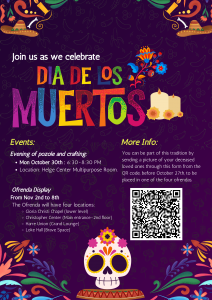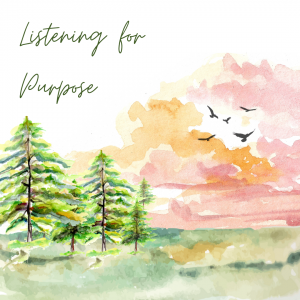September 25, 2023
Kat Peters (on “How I Sabbath, or Try To”)
Text: Genesis 2:4-7
 How is your breathing today? When was the last time you took a deep breath?
How is your breathing today? When was the last time you took a deep breath?
Several people have already spoken about the story of Creation as a place for us to ground our thinking about the Sabbath. Today we return to Genesis to look for more clues on how our identity as creatures of God connects us to God’s life-giving self. God breathed into the first human’s nostrils the breath of life.
Breathing is something that we don’t often think about, at least not on a day-to-day basis. If you do yoga, you might remember that you are often asked to return to your breath as you deepen a stretch or a pose. People who are giving birth are coached to breathe as a way to focus through intense pain.
But on a day to day basis, many of us may fall victim to a now-studied phenomenon called “email apnea,” or “screen apnea.” When Linda Stone, a former Microsoft executive studied this, she found that 80 percent of people hold their breath or breathe shallowly while checking email.
During the pandemic, when I was confronted (not for the first time in my life) with the realities of anxiety, I came to understand that a lot of my anxiety can be mediated through physical practices. Getting enough sleep, exercising sufficiently, eating healthy food and drinking water, and yes, breathing, would help solve a large part of my anxiety.
As I focused on my breath, I experienced the strange sensation of questioning whether I deserved to take a deep breath. It was as if I was rushing from obligation to obligation, thought to thought, and that taking a deep breath was somehow wasting time, or being selfish.
Author James Nestor writes in his book “Breath: The New Science of a Lost Art” that deep breathing, especially through the nose, has many positive health effects. He writes about “how the nose filters heat and treats raw air…how it can trigger different hormones to flood into our bodies, how it can lower our blood pressure, how the stages of a woman’s menstrual cycle are correlated to different areas of the nose, how [the nose] monitors heart rate – on and on and on – even helps store memories.” The nose does that.
Nestor also found that deep breaths have calming effects, while fast breathing amps up energy, as a sort of fight or flight response. This is why we have email apnea – like how a cat that is waiting to pounce on prey takes shallow breaths, so we contemplate our next moves on email with bated breath. And then we end up exhausted, even if we were just sitting at our computers all day.
Our reading from Genesis reminds us that the breath into our nostrils that gave us life comes from God. Perhaps this can remind us how sacred our breath is.
When I have been able to give myself permission to take deep breaths, I find that I can slow my thoughts and get a better handle on whatever anxiety I might be experiencing. And cultivating a daily practice of deep breathing (a daily Sabbath practice, if you will) has helped to prevent anxiety from rearing its ugly head too often.
It turns out that this focus on the breath lends itself to prayer and worship. James Nestor found that many religious prayers and songs follow the framework of slow breaths – specifically a five-and-a-half second (or longer) exhale. For the past several weeks I have been noticing in Morning Prayer that many of our hymns and liturgical songs have this exact amount of breathing built in. This morning, I have asked our musicians to do a purposeful breath after each 4 bars of the hymn. I invite you to sing intentionally this way in the last 2 verses of the hymn.
I would like to close with a practice taught to me by the President of my Lutheran Deaconess community, Deaconess Deborah Graf. She encourages the board and the community to practice what is called a Trinitarian Breath Prayer. After I name each person of the Trinity, I invite you to take a long inhale, and a long exhale. It doesn’t much matter what you think about when you do so – the breath, the living breath that comes from God, will do its own work.
Creator God, we thank you for giving us the breath of life. We come to you as creatures in the name of the Father….. And of the Son…. and of the Holy Spirit…. Amen.


 How is your breathing today? When was the last time you took a deep breath?
How is your breathing today? When was the last time you took a deep breath?